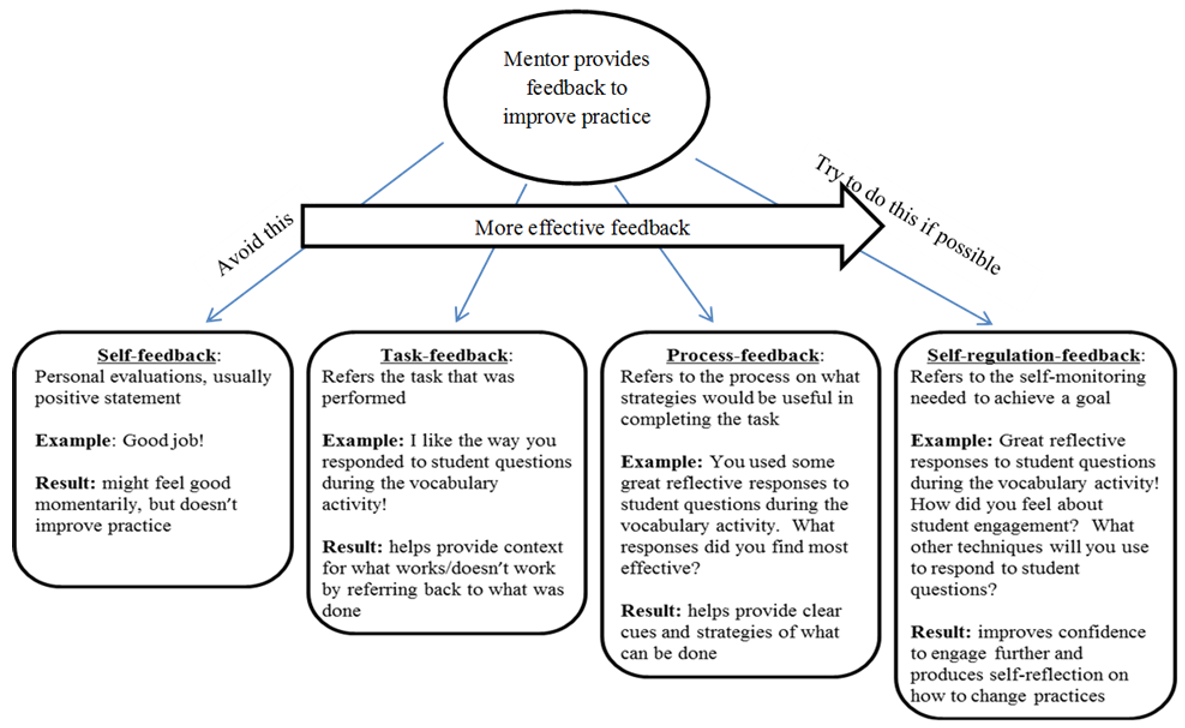Module 7: Meaningful Feedback With Growth Mindset
Essential Questions
- How does the Mentor Cooperating Teacher encourage, support and model the professional learning of the PST through the use of clear, meaningful and timely feedback?
- What types of feedback encourage the development of a growth mindset?
Dear Mentor Teacher
You know how important it is to receive clear, meaningful and timely feedback within the context of a growth mindset. Feedback and a growth mindset allows you to hone and improve your performance in the classroom. When you mentor a PST, and give formative feedback that is clear, meaningful and timely within a growth mindset, and coupled with reflective practice, the PST will improve their performance which will ultimately enhance the educational experience and learning for all students in the classroom.
Dear Pre-service Teacher
Think of a time when you have had a coaching or mentoring experience in your personal and/or professional life. What made that experience helpful and supportive? What behaviors did the mentor/coach exhibit and model that helped engage you to improve your training or job performance? Did you learn within the context of risk-taking, and even from mistakes? This module will frame best practices to ensure that PSTs get the most rewarding experience in their early field experience! Don’t forget – it is your job to self-advocate for effective feedback from your Mentor to grow as a teacher candidate!
What is meant by meaningful feedback?
Meaningful feedback helps to reduce the gap between current performance and what it can be – it responds to the goal(s), improvements toward the goal(s), and what needs to be done to grow.
When a mentor CT gives meaningful feedback to a PST, the PST develops competence and confidence as they learn and grow. Receiving meaningful feedback helps to ensure a growth mindset because reflective practitioners are always improving their practice through the learning process.
What are characteristics of effective, meaningful feedback?
Characteristics include feedback that is…
- SMART: Specific, Measurable, Achievable, Relevant and Time-based
- Supportive: objective, constructive, informative, helpful, and relevant
- Timely: given in close proximity to the event
- Direct: focused and specific to the task or goal
- Positive and encouraging: models professional learning
- Reflective: promotes opportunities for growth
Types of Feedback
Effective feedback is necessary for a productive mentorship relationship, to ensure reflective practice, to improve performance, and to grow as a learner.
When, where, and how often is feedback given? Expectations from the program for what needs to occur during the early field experience will often determine the structure, purpose, and modality of feedback. However, ongoing informal and formal formative feedback is essential during any successful mentorship experience.
|
Structure |
Purpose |
Modality* |
| Informal – organic, communicated during interactions, independent of formal review – this should be regular and ongoing | Formative – feedback is given to help improve performance, increases motivation and self-directed learning – this should be regular and ongoing | Verbal – oral comments must be clear and specific meant for growth and to improve practice – this should be regular and ongoing |
| Formal – structured, meets specific standards, often involves a form to be completed at specific points in the experience | Summative – feedback is on cumulative or final performance, evaluative in nature, broader in scope and measures performance over a longer period of time | Written – able to refer to it later and reflect on it, can be reviewed and assess progress over time – very helpful for the learner! |
*Some people prefer face-to-face feedback, because it is immediate and facial expressions and intentions are made more clear. Others prefer written feedback, but appreciate the possibility to discuss the feedback in person.
Levels of Feedback (Hattie & Timperley, 2007)
- Self-feedback (personal-feedback) refers to a personal evaluation, often an affirmation without context; this feedback is least effective because it does not inform performance.
- Task-feedback refers directly to the task (the what); it is commonly used and helpful because it is focused, but it lacks the generalizability that will be helpful for growth.
- Process-feedback refers to the process to create or complete a task (the how); it is effective at helping to understand specific strategies.
- Self-regulation-feedback includes the task and process, but also helps provide cues for reflection and to strategize ways to master the task and set goals for improvement (the what next); this most powerful form of feedback engages the learner to monitor their own learning and close the gap between where they are and their ultimate goal for success.
Aim for process- and/or self-regulation-feedback!
As indicated in the graphic (Hall, 2017), there are 4 levels of feedback as described:

Feedback Topics
Feedback can be given in any area of performance or professional dispositions. Some examples of topics to share feedback on include: professional knowledge, instructional planning, instructional delivery, assessment, classroom management, the learning environment, cultural competence, learner development, and professionalism.
Conferencing or debriefing helps PSTs to understand classroom practices and student behaviors. Mentor CTs can give self-regulation feedback to recognize how certain instructional methods and strategies are important for the respective content area, and/or student age or developmental level.
PSTs will also need to learn the process of giving meaningful feedback to learners as they engage in the process of giving (and receiving) feedback with students. Allowing PSTs opportunities to provide feedback on student work can help build a relationship between them.
Feedback Loop
A feedback loop should be practiced during any mentorship experience. The purpose of a loop is to improve a process; in this case, it creates an opportunity for open two-way communication and sharing of ideas, questions, concerns, challenges, and successes.
Regular and consistent feedback from Mentor CTs is important for PSTs to feel supported. This loop shows that feedback is a process that is both given and received during early field experience mentorship. We can learn from one another!
Feedback from a PST can help a Mentor CT to gain a new perspective on student work, educational techniques, technological integration, and other key areas of classroom instruction.

“I also ask for feedback…both on my lessons as well as the feedback that I give.” – K. Dove, Mentor CT, Middle
Question for Reflection
How do you like to receive feedback?
